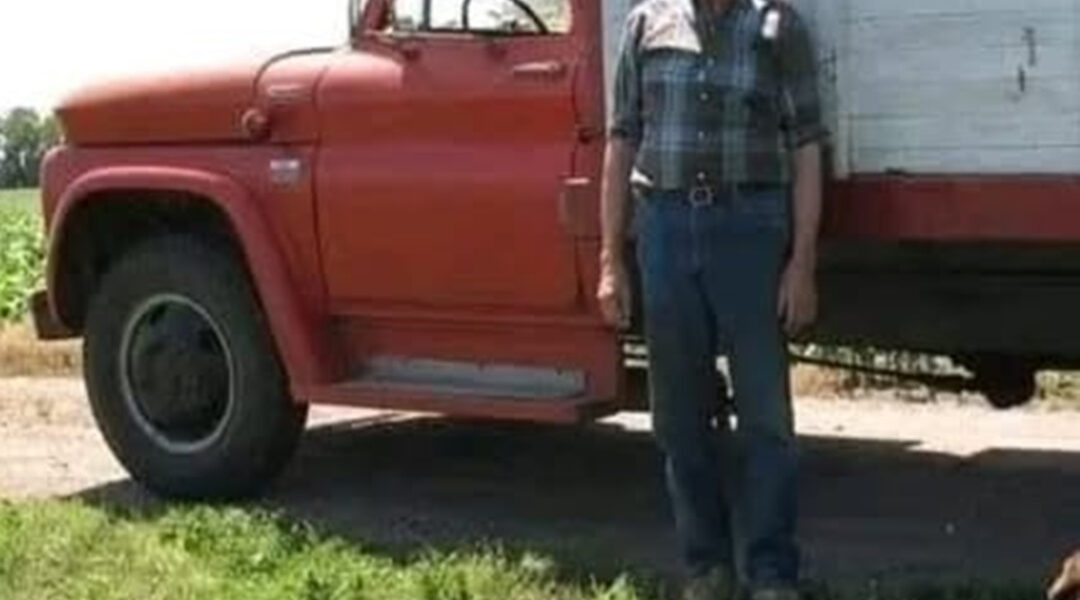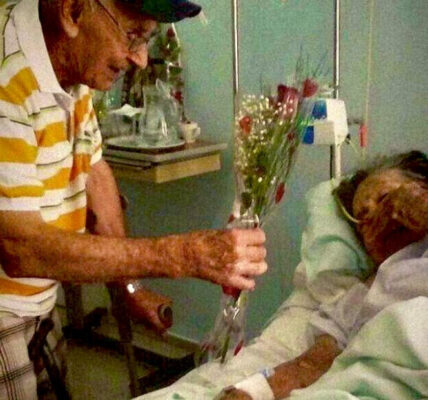
At 92 years old, I continue to live on the farm that has been in my family for 70 years. My father passed it down to me, and in many ways, it feels as though nothing has changed, even though so much has. I was born on this farm, raised on it, and it has shaped who I am, both as a person and as a man who served his country during a time of great uncertainty. I’ve spent my entire life working the land, hauling grain, and raising my family right here, with the steady, familiar hum of this place in the background.
The work has always been hard, but it’s rewarding in its own way. I remember using my 1966 Chevrolet truck, the one I still rely on, to haul grain to the Cargill grain elevator. That truck and I have been through a lot together. It’s a symbol of my life’s work—reliable, durable, and ever faithful. My dog, Gunner, has been by my side for as long as I can remember, just as loyal as the truck, keeping me company while I work the land.
Growing up on the farm, I always knew that my purpose was to work the land, care for animals, and contribute to something greater than myself. My early years were spent helping my family, learning the trade, and making sure the farm was always in good shape. I never knew anything else, and I never wanted to.
When I was drafted for the Korean War, I left behind the life I knew so well. The war took me away from my farm and family, but I always carried that sense of responsibility and love for the land with me. I came back after two years, and picked up right where I left off, marrying a farmer’s daughter and raising our two daughters on the farm.
The farm hasn’t just been the setting of my life; it’s been the foundation of it. It’s where I fell in love, raised my children, and carried on the legacy of those who came before me. My wife and youngest daughter have already passed on, but they, too, spent their lives here, loving and working this land alongside me. The pain of their loss is a heavy one, but I take comfort in knowing they lived the lives they wanted, on the land they loved.
Even now, in my 90s, I wake up every morning to the familiar sights and sounds of the farm. There’s always something that needs doing—whether it’s tending to the crops or checking on the equipment. The seasons come and go, and so do the years, but the farm remains a constant presence in my life.
I’ve seen a lot of changes over the years, but there’s something timeless about the land. The rhythms of farm life are predictable, steady, and unyielding, much like the values I’ve lived by—hard work, integrity, and a deep love for this land.
I often reflect on how much this place has meant to me, and how much it continues to mean to those of us who have worked the land. This farm is more than just dirt and crops—it’s home. It’s where I started, where I raised my family, and where I’ll eventually lay to rest.
This is the life I’ve known, the life I’ve loved. And no matter how much time passes or how much the world changes, I will always be rooted here. The farm will continue, as will the legacy of those who’ve worked it before me. The land has shaped me, and I will continue to shape it until my final day. And when that day comes, I’ll be right where I started—on the farm that I’ve loved for my entire life.





I am fourteen years younger than this man and was raised on a farm. In fact, I was declared dead after being pushed into a well by my elder brother at the age of eighteen months. My father had held my mother by her ankles to grab an arm and retrieve me. He tried everything he could to revive me and gave up, placing me down with my head down an embankment to the well. As he comforted my mother, he looked down at his dead son and saw water flowing from his mouth. He grabbed that son and held him by the feet with his left hand while thumping him on the back with his right hand. One tremendous whack between the shoulder blades sent a torrent of vomit from his lungs. I was rushed to a hospital and survived by the use of the new drug, penicillin, and dedicated hospital staff. I developed double pneumonia but was released from the hospital exactly six months later. I developed double pneumonia again at four and seven, but gained strength from there forward. I joined a monastery at fourteen because I believed God had spared me. However, I needed spectacles at sixteen, the only one in the family, and hearing aids at sixty-one, so there is some residual damage. I have recently written my life story in GOD’S SURE THING by a pseudonym, MALACHI PATRICK CARROLL, to protect the innocent and spare the guilty, and it is available from AMAZON.